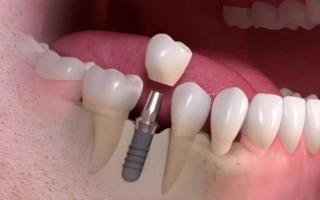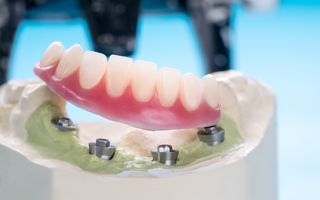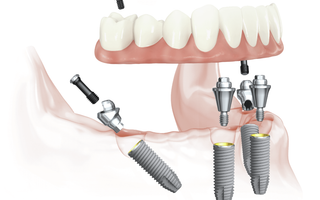How much does a dental implant cost?

Dental implants can provide a natural, long-lasting and highly effective solution to missing or badly damaged teeth, restoring your smile and your confidence.
The impact of missing or damaged teeth can have a significant effect on a person’s life. From feeling self-conscious about the appearance of your teeth or smile through to difficulties with everyday activities such as eating or speaking, tooth damage can cause a range of unwanted problems.
One of the most effective solutions for addressing broken, missing or damaged teeth is a dental implant, which provides a long-lasting, natural-looking replacement that functions just like your healthy teeth.
A question that many people ask when considering dental implants is “how much does a dental implant cost?”. In this article, we’re exploring more about the dental implant process, including what your dental implant procedure might cost and the factors that influence dental implant costs.
Learn more about dental implants, including an idea of dental implant cost expectations in Australia
How much does a dental implant cost?
The cost of dental implants will vary depending on your particular situation and the specific requirements of your tooth or teeth. High quality dental implants, such as those made from premium materials like titanium, can influence the cost, often justifying higher pricing for the components involved. As a rough guide, the cost of a single dental implant will generally range from around $4,500 to $8,500.
Your dentist will be able to discuss the dental implant procedure with you in detail, including information on costs and alternative options to implants.
What is a dental implant?
A dental implant is a small screw-like device, usually made of titanium. It’s placed in the jaw where the missing tooth’s roots were located. As bone grows around the implant over time, the implant fuses with the jawbone and is held in place.
A dental implant crown, often made from durable materials like Zirconia and Emax, is then attached to the implant. This crown is designed to match the shape, size, and colour of the surrounding teeth for a totally natural appearance. It also functions as a normal, healthy tooth, so you won’t wear down your other teeth prematurely due to a missing tooth.
Dental implants can also be used to hold dental bridges or dentures in place.
What are the benefits of dental implants?
Unlike traditional dentures and dental bridges, dental implants attach to the jawbone, making them a great option for replacing a missing tooth. Titanium dental implants, in particular, offer significant advantages over traditional dentures, including improved comfort and quality of life. This means they are firmly held in place and may be more durable and long-lasting than other tooth replacement options.
What’s more, dental implants can be more comfortable than other tooth-replacement options such as dentures, which can cause soreness if they’re not fitted properly. Designed to function just like natural healthy teeth, dental implants don’t slip, move or shift when you’re talking or chewing.
Types of dental implant treatment
Dental implant treatment is a versatile solution for replacing missing teeth, offering several options tailored to individual needs and circumstances. Whether you’re missing a single tooth or multiple teeth, there’s a dental implant treatment that can restore your smile and improve your oral health.
Single dental implant

A single dental implant is an excellent option for replacing a single missing tooth. This treatment involves surgically inserting a titanium post into the jawbone, which acts as a root for the new tooth. Once the implant has fused with the bone, a crown is attached to the post via an abutment. This crown is custom-made to match the shape, size, and color of your natural teeth, ensuring a seamless and natural appearance. Single dental implants are ideal for patients who have lost a tooth due to injury, decay, or gum disease, providing a durable and long-lasting solution.
Implant retained dentures

For patients missing multiple teeth, implant retained dentures offer a stable and secure alternative to traditional dentures. This treatment involves placing several dental implants into the jawbone, which then support a denture. Unlike conventional dentures, implant retained dentures are firmly anchored in place, preventing them from slipping or moving. This stability allows for more comfortable eating and speaking, enhancing overall quality of life. Implant retained dentures are a popular choice for those seeking a more reliable and comfortable solution for multiple missing teeth.
All-On-4 Full Mouth Dental Implants

All-On-4 full mouth dental implants are designed for patients who are missing all of their teeth. This innovative treatment involves placing four dental implants in the jawbone, which then support a full set of replacement teeth. The All-On-4 technique provides a permanent and stable solution, allowing patients to enjoy the look and function of natural teeth. This treatment is particularly beneficial for those seeking a comprehensive solution to extensive tooth loss, offering a significant improvement in both aesthetics and oral health.
What can I expect during a dental implant procedure?
The dental implant process is a relatively lengthy dental procedure that’s usually performed in stages over the course of a few months.
1. First, scans and x-rays will be taken so your dentist can assess your teeth and mouth, and decide where to place the implant.
2. Next, the dental implant surgery will be conducted to fit the implant into your jawbone. This complex procedure is performed under anaesthetic so you don’t feel any pain during the surgery.
3. Over the course of a few months, bone will grow around the dental implant and secure it in place.
4. Your dentist will take an impression or a digital scan of your mouth to make the artificial tooth or teeth, which will then be placed onto the implant
Factors affecting dental implant cost
The cost of dental implants can vary widely based on several factors. Understanding these factors can help you make an informed decision and plan your treatment accordingly.
Dental implant brand
The brand of dental implant used can significantly impact the overall cost of the procedure. High-quality brands like Neodent and Straumann are known for their durability and long-lasting results, but they may come at a higher price. Investing in a reputable brand can be worthwhile, as these implants are designed to provide reliable performance and longevity. When considering dental implants, it’s essential to discuss the options with your dentist to choose a brand that meets your needs and budget.
By considering these factors and discussing them with your dental professional, you can better understand the cost of dental implants and make an informed decision about your treatment.
Can anyone get a dental implant?
Dental implants aren’t a suitable treatment option for everyone. For example, children under the age of 17, people who smoke, or people with active gum disease may not be suitable candidates for implants.
Your dentist will be able to assess your situation and advise on whether dental implants are an appropriate option for you. You’ll need to provide your dentist with your medical history, including any medications you're taking, history of bone disease, any issues related to anaesthetic, and problems with excessive bleeding.
Does private health insurance cover the dental implant cost?
Some private health insurance policies will provide coverage for procedures such as dental implants. This will depend on your individual policy and level of cover, so check with your health insurance provider to find out whether you’re covered for dental implants.
For more information on dental implants, chat with the friendly staff at your local National Dental Care practice. Find your nearest dental practice online now.

